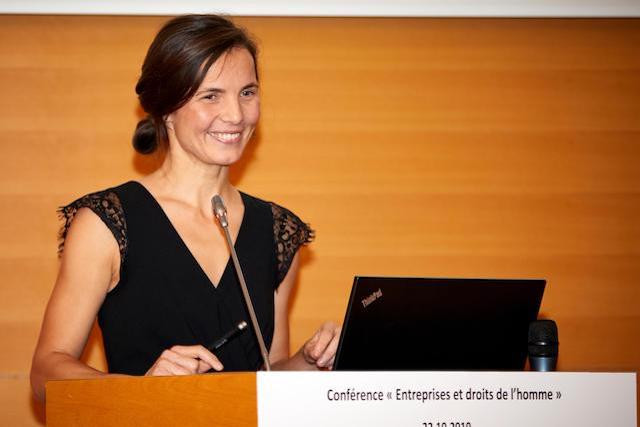On Tuesday, the United Nations General Assembly is electing 15 States to the UN Human Rights Council, the principal intergovernmental body charged with global promotion and protection of human rights. A year from now, Luxembourg will be running for a seat at the Council for the first time.
On Tuesday, the United Nations General Assembly is electing 15 States to the UN Human Rights Council, the principal intergovernmental body charged with global promotion and protection of human rights. A year from now, Luxembourg will be running for a seat at the Council for the first time.
The UN Human Rights Council is the main intergovernmental forum responsible for addressing and taking action on human rights violations worldwide. It prepares new international standards and promotes the effective coordination and mainstreaming of human rights within the UN system.
The Council discusses both urgent human rights crises and more long-term engagement and capacity-building issues; it looks at specific country situations as well as at thematic issues (e.g., the rights of the child, gender equality, rights of migrants and refugees, etc.). It acts through adopting resolutions, some of which can launch fact-finding missions or establish commissions of inquiry.
The Council comprises 47 member states elected by the UN General Assembly for three-year terms, renewable once. The Council seats are divided between the five UN “regions” based on equitable geographical distribution, including Africa (13); Asia (13); Latin America and the Caribbean (8); Eastern Europe (6), and Western Europe and Others (WEOG) (7). The allocation of the seats to different regional groups ensures that there is no overrepresentation of certain regions and countries. One third of the seats are renewed each year. Members are elected by a simple majority vote, through a secret ballot.
Some common concerns facing the council
The Council was intended as a fresh beginning following the end of the Commission. However, after almost 15 years of operation, it is facing similar criticisms that led to the demise of its predecessor. One of the criticisms is that the Council disproportionately targets certain countries for condemnation while not paying enough attention to others. A further criticism concerns the membership of the Council, which sometimes includes states with notoriously bad human rights records. China, Cuba, Saudi Arabia and Russia have all served as members of the Council and are among the candidates running for a seat in today’s election.
In general, election of such states to the Council largely is a result of power brokering between states and regional groups. Human rights NGOs have also pointed to the phenomenon of “clean slates” candidatures, whereby the number of candidates is equal to the number of vacant seats and so no competitive process takes place. Independent civil society organizations have criticised non-competitive, clean slates for turning the election into an appointment process that violates the spirit of the Council’s membership rules and urged the UN members to refrain from voting for candidates that are unfit for membership. On the other hand, a competitive election is no guarantee for the ultimate selection of a more rights-respecting state.

An image taken at the Council last year Photo: Başak Bağlayan
Luxembourg’s candidacy
Luxembourg’s candidacy in 2021 is also likely to take place in a clean slate context, unless another WEOG state decides to submit an application in the coming months. The other two countries bidding for one of the three available WEOG seats are Finland and Italy. Finland already served as a member during the Council’s First Cycle, from 2006-2007. Italy is currently serving as a member and will be running for a second term in 2021. 2021 will be the first time that Luxembourg will be in the run for a seat at the Council, which may work in its advantage. Luxembourg is also likely to attract the votes of other small countries and Francophone countries. Luxembourg remains among the countries that is most generous in terms of Official Development Assistance, allocating 1% of its gross national income to this end. This is likely to help attract the votes of developing countries.
Civil society organisations observing the Council elections have prepared scorecards that assess each candidate country based on certain criteria on their international and domestic commitments to human rights. Luxembourg will receive an almost full score based on this criterion. One point that is missing is the failure to ratify all core 9 international human rights treaties. Luxembourg so far has ratified seven of them with their optional protocols. The ratification instrument for another, the Convention for the Protection of All Persons from Enforced Disappearance, has been sent to Parliament almost two years ago.
Over the next months, the Grand Duchy is expected to conduct an election campaign to underscore its lasting commitment to multilateralism and its reputation as a global human rights champion. While the details of such a campaign, as well as voluntary pledges for national and international commitments, are not public yet, Minister Jean Asselborn’s address to the Council in February 2020 gives some indications on what Luxembourg’s priorities may be, including the protection of human rights defenders, climate change, and protection against different forms of discrimination. When successful in 2021, the Grand-Duchy will be able to put these issues on the agenda of the Council, an imperfect but necessary institution, and fight for improving human rights protection in a world that longs for such improvement.
Başak Bağlayan is a post-doctoral researcher specialising in human rights at the University of Luxembourg, Faculty of Law, Economics and Finance, Department of Law.
